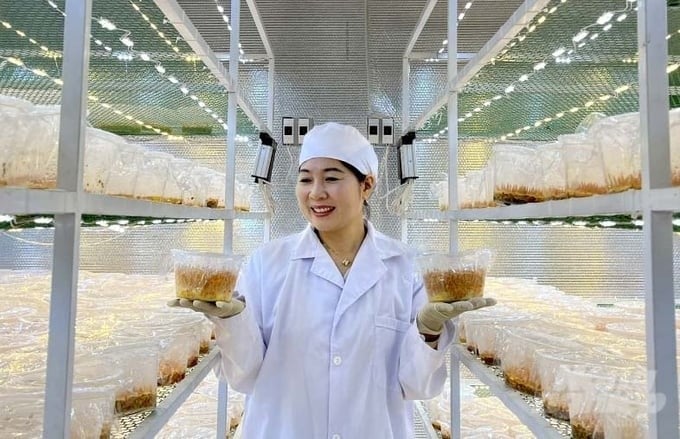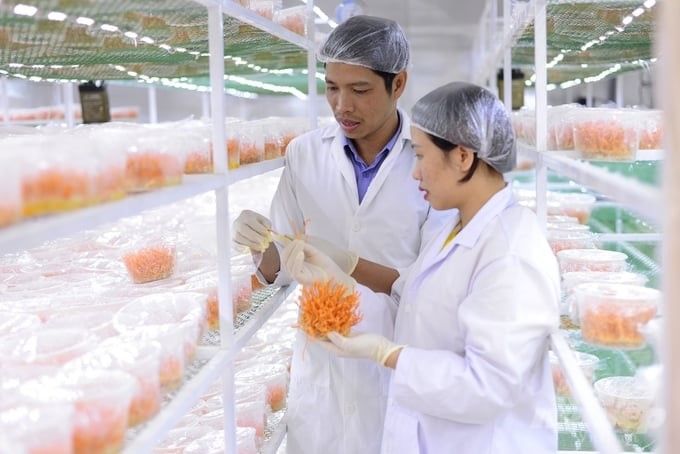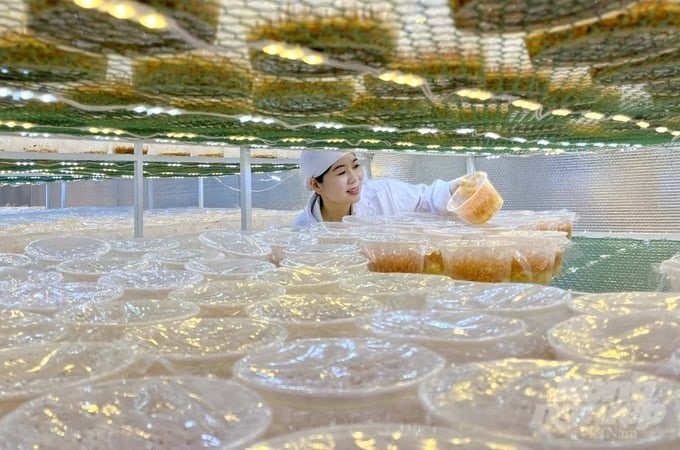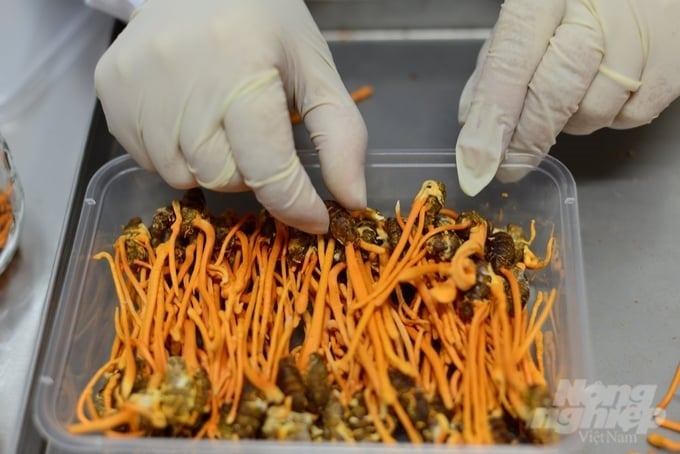November 27, 2025 | 08:02 GMT +7
November 27, 2025 | 08:02 GMT +7
Hotline: 0913.378.918
November 27, 2025 | 08:02 GMT +7
Hotline: 0913.378.918

Each year, Thien Huong Phat Da Lat Co., Ltd. produces and supplies to the market 700–800 kg of dried cordyceps mushrooms of all kinds. Photo: M.H.
Mr. Nguyen Xuan Quang in Da Lat (Lam Dong) is known as one of the people who was early passionate about cordyceps mushrooms. In 2013, realizing that cordyceps is a precious medicinal herb that can be grown in laboratories and factories, Mr. Quang embarked on investment and production.
"At that time, cordyceps production techniques were scientifically implemented, and the medicinal value of the product also reached 70% compared to natural cordyceps. However, it is extremely difficult to develop markets because users still mainly use natural mushrooms, especially whole cordyceps from Tibet (China)," said Mr. Nguyen Xuan Quang.
Difficulties in market development caused the cordyceps production of Mr. Quang’s family to be interrupted for many years. By 2019, realizing that the market was changing, Mr. Quang's family and some people contributed capital to reinvest, establish Thien Huong Phat Da Lat Co., Ltd., and expand production scale at the facility on Vo Truong Toan Street, Ward 8, Da Lat City.
According to Mr. Nguyen Xuan Quang, the production facility is currently methodically built on a scale of 1,000 m2 with many modern pieces of equipment. Here, mushroom production is carried out according to a new process and goes through many stages with strict technical processes.

Cordyceps mushrooms are transplanted directly into glass bottles to serve customers' wine-soaking needs. Photo: M.H.
Regarding the cordyceps mushroom production method, Mr. Quang said: "We use brown rice and many other ingredients to create a growing media for mushrooms. The growing media meeting technical standards will be transferred to the seeding stage and then silk incubation. After incubation, cordyceps mushrooms are transferred to light activation, growing, and finally harvesting and processing. In each process, for mushrooms to grow well, production staff must closely monitor temperature and humidity as well as comply with the regulation on time for each stage."
According to the owner of the production facility, under good conditions, producers can harvest cordyceps mushrooms after 90 days. Ms. Nguyen Thi Huong (co-founder of Thien Huong Phat Da Lat Co., Ltd.) said that the unit is now producing, processing, and launching product lines including fresh and dried cordyceps mushrooms, cordyceps tea, cordyceps honey, cordyceps nutrition, and many other processed products.

Cordyceps mushrooms can be harvested after 90 days of care. Photo: M.H.
Along with that, to meet market demand, the unit also produces wine soaked with cordyceps. For this product line, the unit cultivates and transplants mushrooms directly into glass bottles, then extracts alcohol and soaks them according to customer requirements. Each type of cordyceps wine is soaked, brewed, bottled, packaged in many forms, and distributed in all provinces and cities nationwide.
Recently, to improve the quality and value of products, Mr. Nguyen Xuan Quang's production facility has embarked on research and production of cordyceps mushrooms from silkworm pupae. Accordingly, this enterprise has linked with a number of households growing mulberries to raise silkworms in the province to ensure the source of pupa raw material for production. Mr. Luong Le Quoc Chi, a technician at the company, said that the cordyceps mushroom product from silkworm pupae depends heavily on input factors. Therefore, the unit must meticulously select pupae before culturing for fungus.

Currently, dried cordyceps from Thien Huong Phat Da Lat Co., Ltd. are sold on the market for VND 35 million/kg. Photo: M.H.
"Normally, out of 100 pupae, we can only choose about 70 heads that can meet production needs. The selected heads must be big, strong, and especially not too young or too old," Mr. Luong Le Quoc Chi said, adding that during the process of culturing mushroom embryos, pupae must be guaranteed with a certain level of dryness. After transplanting, the pupae are transferred to a dark incubation room for 7–10 days.
At this stage, producers must strictly comply with regulations on time, temperature, and humidity and must check regularly to grasp growth. During the dark incubation period, if the pupa is found to be broken, watery, or incompatible, it must be removed.

Cordyceps products from silkworm pupae cost up to VND 80–100 million/kg dry. Photo: M.H.
For cordyceps products from silkworm pupae, the production process lasts 90–120 days. After this time, quality products will be selected by the enterprise and transferred to pre-processing, processing, and distribution to the market.
Talking about medicinal value, Mr. Nguyen Xuan Quang said that cordyceps from silkworm pupae reaches 70% compared to whole cordyceps in the natural environment. Therefore, this product is classified as the highest quality product, with a selling price to the market of VND 80–100 million/kg dry.
According to Mr. Nguyen Xuan Quang, the enterprise is expanding its linkages with many mulberry-growing households to raise silkworms in Lam Dong to produce organic pupae, aiming to create higher-quality products. Currently, each year, Thien Huong Phat Da Lat Co., Ltd. produces and supplies to the market 700–800 kg of dried cordyceps mushrooms of all kinds, earning billions of dong.
Translated by Huyen Vu Thu

(VAN) Tay Ninh’s livestock sector is undergoing a major transformation, applying high-tech, closed-loop circular models to build sustainable value chains.
/2025/11/26/3627-4-082628_818.jpg)
(VAN) From a small café on the red basalt highlands, Le Van Hoang started a business with clean coffee, building Enjoi Coffee into a symbol of organic agriculture in the Lam Dong plateau.
/2025/11/25/0045-1-135246_13.jpg)
(VAN) Ca Mau is researching a model of sea-encroaching embankments combined with viaducts and logistics service zones, aiming both to prevent erosion and create land funds for marine economic development.

(VAN) The information was shared at the seminar 'Urban Agriculture - Solutions for Developing Green Spaces,' organized by the Kinh te & Do thi Newspaper and the Biotechnology Center of Ho Chi Minh City.
/2025/11/19/4141-2-132831_216.jpg)
(VAN) One of Japfa's outstanding solutions is implementing digital transformation and artificial intelligence (AI) to optimize operations, enhance productivity, and advance sustainable development.
/2025/11/19/4847-1-093540_448.jpg)
(VAN) The Gia Lai Provincial People’s Committee had a working session with the delegation of the U.S. Department of Agriculture, the State of Idaho, and representatives of the State's leading enterprises.

(VAN) Ca Mau has a sufficient foundation to become a strong regional aquaculture center, where production integrates the economy, the environment, and the lives of the people.